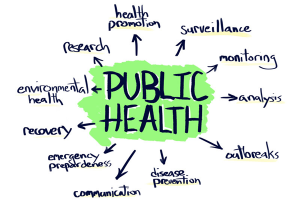BSc. Public Health (a 4year undergraduate course in public health) is becoming a popular and recognized degree around the world. Upon completion, the public health graduates commonly work with governments for health planning. However, they don’t see patients but are more involved in administration, epidemiology and health planning. Some proceed to do Masters, especially if they want to work in international organizations like WHO.
The WHO currently has its first Non-physician head (Dr Ghebreyesus has a first degree in Biology, Masters in Immunity of Infectious diseases and PhD in Public Health) and he is doing quite well. We are likely to see more people with similar backgrounds take leadership in global health matters going forward.
However, it is good to note and clarify that many of those who undertook this course (majorly in Nigeria) were of the erroneous impression that they could become “Public Health Physicians” over time. On graduation, then they are hit with the realization that they do not have “license” to practice as Medical Doctors, Pharmacists, Nurses, Medical Laboratory Scientists or Medical Records Officers. Thus, they have no tangible role in hospitals and health centres. One of the viable options usually advised for them is to veer into a “research career” as trying to enter into the health practice space might lead to a lot of frustration. Also possibly into the health, safety and environment niche.
Ideally, Public Health should be a post-graduate program; professionally to culminate in the Fellowship, or academically to culminate in a PhD. Lawyers, politicians, geologists etc. can undertake academic postgraduate programs in Public Health (MSc. PH) just like the MPH for Medical Doctors and Nurses. It enables them to apply their basic qualification in promoting the health of the public. It, however, doesn’t give them the license (or short cut) to practice as a health practitioner.
During an event organized by the Royal Society of Tropical Medicine and Hygiene, London in 2013 in one of the discussions with a number of participants, one of them held a basic science degree and later did an MPH. She confessed that whenever she was discussing with other MPH holders who were Medical Doctors, she always felt “left out”. Likewise, a student studying public health in one of the private universities in Nigeria, was once attached to a health centre for one week during the course of her bachelor’s degree program, and all she could do was come each day to “observe”. She couldn’t really do anything “medical or clinical” because they are not trained to be core health care workers. Hence, this begs the question, what do you expect from a BSc. Public Health Holder? Is it Community Care? We already have CHOs and CHEWs for that. Is it Nutrition? We have Nutritionist and Dietitians. Is it Health Education? We have trained Health Educators too.

Usually, national/international NGOs, health institutions, ministries of health (among other ministries) carry out health related activities that require qualified health workers who have enough practical experience to implement policies as well as monitor and supervise those in hospitals and health centres. However, some NGOs request and recruit persons with a Bachelor’s degree in health professions including Public Health for certain positions (especially, to provide technical assistance in the ongoing pandemic) but would also highlight in those adverts that having a “Medical or Nursing qualification” or “Master’s degree in Public Health” is an added advantage in getting recruited. Also, in the Ministry of Health the largest number of non-health workers are administrative officers and accountants.
Currently in Nigeria, a lot of private universities offer the courses for a bachelor’s degree in public health. However, with enrollees having little or no real knowledge on their options to work when they graduate. Therefore, to avoid disappointments and future troubles in career pathway, struggling for relevance in the health sector and usurping responsibilities of other trained Health workers; Recommendation for now, would be to read a basic science or basic medical science course like Botany, Biochemistry, Anatomy and Physiology etc. which has a wider range of career progression including teaching.
In Nigeria, one of the causes of unemployment is that some courses offered in the Universities have no real job opportunities. As you see graduates with degrees in basic medical sciences, such as Anatomy and Physiology – who are not interested in lecturing or research – working in banks, or becoming entrepreneurs. Likewise, job opportunities for BSc. PH holders in Nigeria today, are few and far in between. We look forward to a Nigeria, where every graduate is able to reach their full potential but that must be achieved without incursion into other clearly delineated fields.
In summary, getting a bachelor’s degree in public health is not close or an alternative to studying medicine and becoming a public health physician (for which a medical license is needed to practice). People need to be properly educated and enlightened on career choices. career days in secondary schools, which exposes students and brings the other science options (asides medicine) to the table should be invested into.
Acronyms:
CHEWs – Community Health Extension Workers
CHOs – Community Health Officers
NGOs – Non Governmental Organizations
MPH – Masters of Public Health (Professional Masters only for Medical Practitioners)
MSc. PH – Masters in Public Health (Academic Masters for everyone in the medical, social and human sciences field interested in public health)
Editor’s note:
This article is an extract from an intellectual discussion on the Young Doctors Forum (MWAN) group. Chief Contributor – Dr. Minnie Oseji (MWAN National President & Consultant Public Health and Community Physician/Health Services Researcher). Other contributors – Dr Ibiyemi Somefun, Dr Nguavese Obemeata, Dr Ezinne Erhirhie, Dr Evo Esievoadje, Dr Oghogho Braimah.




